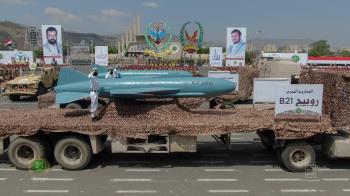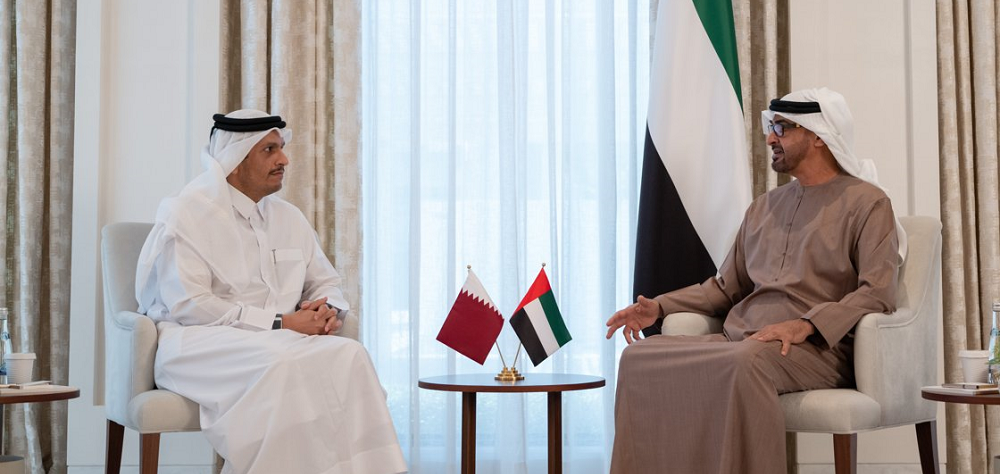Alwaght- In an important development, Abu Dhabi Crown Prince Mohammed bin Zayed Al Nahyan met the Qatari Foreign Minister Mohammed bin Rahman Al Thani in Abu Dhabi, media reported.
This was the first meeting of the de facto ruler of the UAE with a high-ranking Qatari official since the (Persian) Gulf Cooperation Council crisis in June 2017, when Saudi Arabia, the UAE, Egypt, and Bahrain severed ties with Qatar and imposed a blockade on the small emirate. The meeting was significant because despite the largely symbolic reconciliation of the two sides in early January meeting in Saudi Arabia, Abu Dhabi-Doha relations are still apparently hostile.
This meeting takes place in the context of earlier meetings between the officials of the two countries, including a meeting of UAE National Security Adviser Tahnoun bin Zayed Al Nahyan with Tamim bin Hamad Al Thani, emir of Qatar, on August 26. Also in mid-September, a meeting gathered together Tahnoun, Saudi Crown Prince Mohammed bin Salman, and the Qatari Emir in a Red Sea beach resort. The photo of the three went viral and received wide attention from media and political observers. Therefore, the meeting between bin Zayed and bin Rahman should be considered as the culmination of the pursuit of reconciliation between the two countries behind the scenes and giving the results publicity.
Still, there is a question: What is the goal of bin Zayed's meeting with a Qatari official after four years of tense relations? Where will this de-escalation go with regard to the wide-ranging differences between the two sides?
Post-US regional order: The requirements
The UAE involvement in de-escalation process with Qatar should be linked to regional developments as well as the future order in West Asia region. The new order would be largely post-American, especially as the US has already begun removing its troops from the region. More than one evidence show that the US full withdrawal from the region is certain. The scandalous Afghanistan pullout even sped up this process.
The West Asian region is on the verge of transition to a post-American order, and in such circumstance the UAE and bin Zayed himself, who had based their grand foreign policy strategy on maintaining a US military presence in the region— with direct cash flows and with massive military purchases from American arms manufacturers— are on the road to reviewing their strategies. Therefore, developing an understanding of the new equations of power and security, bin Zayed tries to give centrality to de-escalating with Muslim Brotherhood camp, to which Qatar is a bankroller.
In other words, the emergence of new conditions brings bin Zayed to the notion that he needs to depart from utter reliance to Washington. He is clearly concerned that in the aftermath of the US withdrawal, the balance of power in West Asia will change, and that in this context, numerous foreign policy tensions could pose a major threat to Abu Dhabi.
Trying not to fall behind Saudi Arabia and to avoid isolation in inter-Arab reconciliation trend
Bin Zayed should be considered the main architect of the anti-Qatari diplomatic moves, although when it comes to the leader of the crisis with Qatar, Saudi Arabia's name shines. In the aftermath of the official announcement of the Qatar embargo, the UAE put the biggest wave of pressure on Doha. The UAE stressed the implementation of 13 conditions set to end the ban on Qatar, which included shutdown of Al-Jazeera news network, closure of the Turkish military base in Qatar, severance of ties with the Muslim Brotherhood, and downscale of relations with Iran.
Even when the Saudi Arabia accepted reconciliation with Qatar under difficult home and regional conditions, Abu Dhabi opposed the idea. Actually, all the evidence showed that ibn Zayed did not agree with the signing of the reconciliation agreement and rebuked Riyadh. As under the new equations inter-Arab reconciliation is an unavailable reality, the Emirates powerful man knows it with certainty that opposing de-escalation with Qatar only isolates UAE regionally.
From a different dimension, bin Zayed is in a quiet and unstated competition with Saudi Arabia for Arab world leadership. The UAE is off convergence with Riyadh in various regional cases and in recent years has shown that it intends to pursue an independent policy in the midst of crisis and not be presented as a Riyadh policy tail. The meeting with Qatari FM serves this purpose.
What is the outlook?
Given the requirements of reconciliation, the Emirati-Qatari détente can go farther in the future. However, levels of issues and crises live on in their ties and can generate new crises between them. As the most important issue, bin Zayed focuses extensively on checking Muslim Brotherhood influence in the Muslim world. This is his most important political concern, as he once said it.
In the not-too-distant future, crisis can resurface between the two Arab countries like a reopened wound. Despite the recent diplomatic shows, Doha is in essential policy conflict with the UAE in Syria, Yemen, Libya, and type of relations with Iran, something minimizing the possibility of Abu Dhabi and Doha reestablishing friendly ties.



























